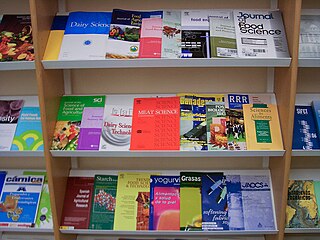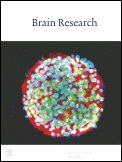
Yeasts are eukaryotic, single-celled microorganisms classified as members of the fungus kingdom. The first yeast originated hundreds of millions of years ago, and at least 1,500 species are currently recognized. They are estimated to constitute 1% of all described fungal species.

In academic publishing, a scientific journal is a periodical publication intended to further the progress of science, usually by sharing findings from research with readers. They are normally specialized based on discipline, with authors picking which one they send their manuscripts to.

Saccharomyces cerevisiae is a species of yeast. The species has been instrumental in winemaking, baking, and brewing since ancient times. It is believed to have been originally isolated from the skin of grapes. It is one of the most intensively studied eukaryotic model organisms in molecular and cell biology, much like Escherichia coli as the model bacterium. It is the microorganism behind the most common type of fermentation. S. cerevisiae cells are round to ovoid, 5–10 μm in diameter. It reproduces by budding.

An academic journal or scholarly journal is a periodical publication in which scholarship relating to a particular academic discipline is published. Academic journals serve as permanent and transparent forums for the presentation, scrutiny, and discussion of research. They nearly universally require peer review or other scrutiny from contemporaries competent and established in their respective fields. Content typically takes the form of articles presenting original research, review articles, or book reviews. The purpose of an academic journal, according to Henry Oldenburg, is to give researchers a venue to "impart their knowledge to one another, and contribute what they can to the Grand design of improving natural knowledge, and perfecting all Philosophical Arts, and Sciences."
Proceedings of the Royal Society is the main research journal of the Royal Society. The journal began in 1831 and was split into two series in 1905:
The impact factor (IF) or journal impact factor (JIF) of an academic journal is a scientometric index calculated by Clarivate that reflects the yearly mean number of citations of articles published in the last two years in a given journal, as indexed by Clarivate's Web of Science.

Cell is a peer-reviewed scientific journal publishing research papers across a broad range of disciplines within the life sciences. Areas covered include molecular biology, cell biology, systems biology, stem cells, developmental biology, genetics and genomics, proteomics, cancer research, immunology, neuroscience, structural biology, microbiology, virology, physiology, biophysics, and computational biology. The journal was established in 1974 by Benjamin Lewin and is published twice monthly by Cell Press, an imprint of Elsevier.

Geophysical Research Letters is a biweekly peer-reviewed scientific journal of geoscience published by the American Geophysical Union that was established in 1974. The editor-in-chief is Harihar Rajaram.

PLOS One is a peer-reviewed open access mega journal published by the Public Library of Science (PLOS) since 2006. The journal covers primary research from any discipline within science and medicine. The Public Library of Science began in 2000 with an online petition initiative by Nobel Prize winner Harold Varmus, formerly director of the National Institutes of Health and at that time director of Memorial Sloan–Kettering Cancer Center; Patrick O. Brown, a biochemist at Stanford University; and Michael Eisen, a computational biologist at the University of California, Berkeley, and the Lawrence Berkeley National Laboratory.

The Journal of Personality and Social Psychology is a monthly peer-reviewed scientific journal published by the American Psychological Association that was established in 1965. It covers the fields of social and personality psychology. The editors-in-chief are Shinobu Kitayama, Colin Wayne Leach, and Richard E. Lucas.
Journal Citation Reports (JCR) is an annual publication by Clarivate. It has been integrated with the Web of Science and is accessed from the Web of Science Core Collection. It provides information about academic journals in the natural and social sciences, including impact factors. The JCR was originally published as a part of the Science Citation Index. Currently, the JCR, as a distinct service, is based on citations compiled from the Science Citation Index Expanded and the Social Sciences Citation Index. As of the 2023 edition, journals from the Arts and Humanities Citation Index and the Emerging Sources Citation Index will also be included.

The FEBS Journal is a biweekly peer-reviewed scientific journal published by John Wiley & Sons on behalf of the Federation of European Biochemical Societies. It covers research on all aspects of biochemistry, molecular biology, cell biology, and the molecular bases of disease. The editor-in-chief is Seamus Martin, who took over from Richard Perham in 2014.
The International Journal of Systematic and Evolutionary Microbiology is a peer-reviewed scientific journal covering research in the field of microbial systematics that was established in 1951. Its scope covers the taxonomy, nomenclature, identification, characterisation, culture preservation, phylogeny, evolution, and biodiversity of all microorganisms, including prokaryotes, yeasts and yeast-like organisms, protozoa and algae. The journal is currently published monthly by the Microbiology Society.
The Journal of Sex Research is a peer-reviewed academic journal covering the study of human sexuality and the field of sexology in general. It is published by Routledge on behalf of the Society for the Scientific Study of Sexuality. In 1963, the society had published a one-issue journal entitled Advances in Sex Research. The Journal of Sex Research was then first published in 1965. The current editor-in-chief is Cynthia A. Graham.

Nature Genetics is a peer-reviewed scientific journal published by Nature Portfolio. It was established in 1992. It covers research in genetics. The chief editor is Tiago Faial.

Brain Research is a peer-reviewed scientific journal focusing on several aspects of neuroscience. It publishes research reports and "minireviews". The editor-in-chief is Matthew J. LaVoie.

Astronomy & Geophysics (A&G) is a scientific journal and trade magazine published on behalf of the Royal Astronomical Society (RAS) by Oxford University Press. It publishes a mixture of content of interest to astronomers and geophysicists: news reports, interviews, topical reviews, historical investigations, obituaries, meeting reports and updates on the activities of the RAS. Full-length articles are peer reviewed.
Mycoscience is a peer-reviewed scientific journal covering all aspects of basic and applied research on fungi, including lichens, yeasts, oomycetes, and slime moulds. It is the official journal of the Mycological Society of Japan. A publication of the Mycological Society of Japan, it was founded in 1956 as Transactions of the Mycological Society of Japan (1956–1993) and was later titled Mycoscience (1994–present).

Yoshinori Ohsumi is a Japanese cell biologist specializing in autophagy, the process that cells use to destroy and recycle cellular components. Ohsumi is a professor at Tokyo Institute of Technology's Institute of Innovative Research. He received the Kyoto Prize for Basic Sciences in 2012, the 2016 Nobel Prize in Physiology or Medicine, and the 2017 Breakthrough Prize in Life Sciences for his discoveries of mechanisms for autophagy.
FEMS Yeast Research is a peer-reviewed scientific journal focusing on yeast and yeast-like organisms. The journal was established in 2001. It is published by Oxford University Press on behalf of the Federation of European Microbiological Societies and the editor-in-chief is John Morrissey.












